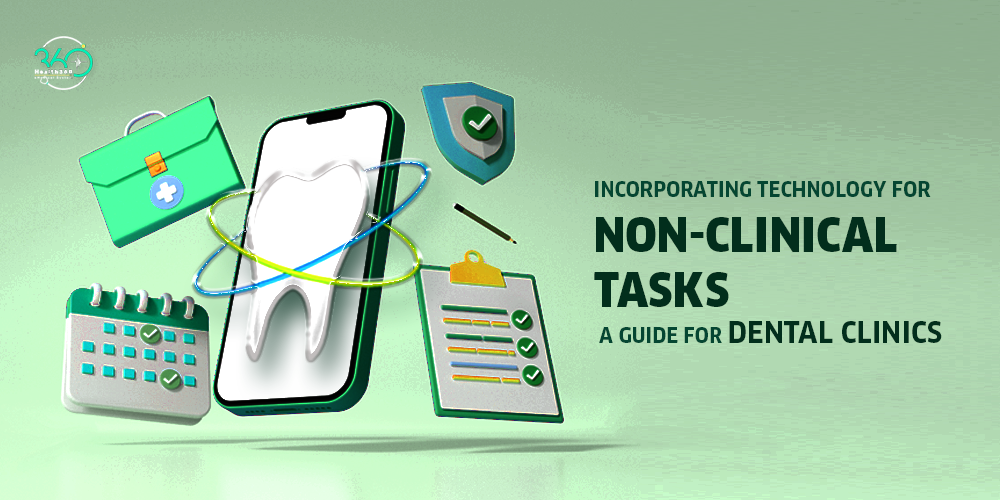
Incorporating Technology for Non-clinical Tasks: A Guide for Dental Clinics
In today’s fast-paced world, technology has become a game-changer in various industries, including healthcare. Dental clinics are no exception. The integration of technology has revolutionized the way dental clinics operate, streamlining processes, improving patient experiences, and enhancing overall efficiency.
This blog covers the key aspects of incorporating technology for non-clinical tasks in dental clinics. It provides a comprehensive framework for discussing the benefits, specific tasks, types of technology solutions, best practices, and real-life examples of successful technology integration. Let’s get into it.
Why is Technology Integration Essential?
Incorporating technology into dental clinics has become essential for modern-day dental practices. Technology integration offers numerous benefits that can significantly enhance the overall operations of a dental clinic. Let’s take a closer look at some of the key advantages of technology integration in dental clinics:
- Improved efficiency: Technology streamlines non-clinical tasks, reducing errors, paperwork, and time-consuming tasks.
- Enhanced patient experience: Online appointment booking, patient portals, and automated reminders improve patient satisfaction and retention.
- Better communication and collaboration: Technology enables seamless communication and sharing of patient information among clinic staff and practitioners.
- Data-driven decision-making: Access to comprehensive data and analytics helps clinics make informed decisions to optimize patient care and operations.
- Increased productivity: Technology automates repetitive tasks, freeing up time for dental professionals to focus on patient care.
- Competitive advantage: Embracing technology demonstrates innovation and modernization, attracting more patients and improving the clinic’s reputation.
- Cost-effective: Technology offers cost-effective solutions for dental clinics, reducing manual efforts and operational costs.
In short, embracing technology can transform dental clinic operations and improve patient care and business success.
Empowering Non-clinical Tasks with Technology
We have explored the benefits of incorporating technology into a clinic. Now, let’s examine the tasks that can be automated or improved with the help of technology. Both clinical and non-clinical practices can benefit from technology. In this section, we will focus on non-clinical tasks that can be optimized using technology.
- Appointment Scheduling: Technology can streamline scheduling appointments, sending reminders to patients, and managing the appointment calendar efficiently.
- Patient Registration: Integrating technology in front desk management can automate the process of patient registration, data entry, and record-keeping, making it more accurate and efficient.
- Invoice Generation and Record: Technology can automate billing processes, including generating invoices, processing, and managing payments. This can reduce human errors and keep track of the payment record.
- Internal Communication: To facilitate proper communication and collaboration among healthcare staff, or with patients, you can use technologies. It assures for seamless exchange of information, coordination of care, and remote consultations.
- Marketing and Patient Engagement: Technology can support digital marketing efforts, including social media management, online reviews, and patient engagement tools, enhancing the clinic’s online presence and patient engagement.
- Support: In addition to other tasks, using technology can enhance transparency in treatment, patient pathways, and practices. In case, any patient has any queries, they can be processed online.
Beyond these non-clinical tasks, technology can play a vital role in clinical tasks like Electronic Health Records (EHR) management, medical imaging and diagnostics, medication management, telehealth, remote monitoring, clinical decision support, surgical assistance, etc.
But, it’s necessary to categorize the needs as non-clinical and clinical tasks as it helps you to make important decisions on choosing the right technology support.
Software Solutions Used in Dental Clinics
There are multiple software solutions that are continuously enhancing the potential of dental clinics. Both in the clinical process and non-clinical processes, the role of technology is significant. Let’s check some of the software solutions used in dental clinics now.
- Dental Practice Management Software: Practice management software is designed to streamline administrative tasks such as appointment scheduling, patient registration, billing and insurance management, and reporting. It helps dental clinics manage their day-to-day operations efficiently and improve patient flow.
- Electronic Health Records (EHR) Systems: EHR systems store and manage patient dental health records electronically, including medical history, treatment plans, radiographs, and notes. EHRs allow for easy access to patient information, improve communication among dental staff, and enhance treatment planning and coordination.
- CAD/CAM: Computer-Aided Design and Computer-Aided Manufacturing (CAD/CAM) technology allows for the creation of dental restorations, such as crowns, veneers, and dentures, using computer-assisted design and manufacturing processes. CAD/CAM systems provide precise and efficient dental restorations, reducing the need for multiple appointments and improving patient satisfaction.
- Telehealth and Virtual Consultations: Telehealth and virtual consultation solutions enable dental clinics to provide remote consultations, patient follow-ups, and oral health advice through video conferencing or online platforms. Telehealth solutions can expand access to care, particularly for patients in remote areas or with limited mobility.
- Patient Communication and Appointment Reminder Systems: Patient communication and appointment reminder systems facilitate communication with patients through automated reminders, notifications, and messaging. These systems reduce no-shows, improve patient communication, and optimize appointment scheduling.
In the list, the need for clinical technology will vary depending on the needs and preferences of each clinic. But, non-clinical software solutions are basic and essential for all sizes of dental clinics. So, when you are looking for enhancement in your dental clinic, you have to provide equal preference to the non-clinical software as same as clinical software.
How to Choose the Right Hospital Management System?
When it comes to non-clinical software, choosing a hospital management system is the right choice to opt. It can streamline online appointment booking, appointment scheduling, patient registration, billing, telehealth, vaccination slot booking, and prescription management,
So, choosing a hospital management system (software) can help you to manage your clinic with ease. eMS is the best choice to get your customized hospital management software that can fulfill all your needs.
Comments are closed.